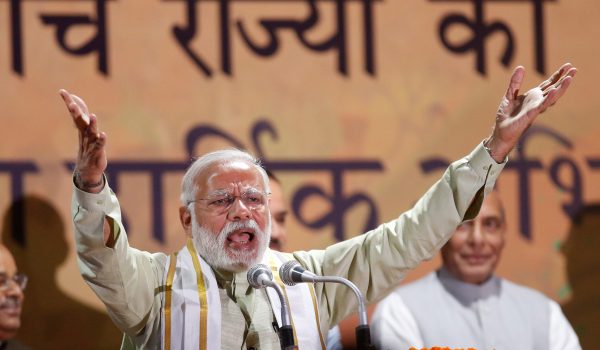It is now the pole around which the Indian political economy will evolve in the foreseeable future.
Even Prime Minister Narendra Modi’s most trenchant critics must now recognise that he has charted a new course in Indian politics. He has the credibility, legitimacy and trust that no other leader has had in recent times.
The question to ask is whether he, like former Indian prime minister Indira Gandhi, will allow this unparalleled leadership status to be squandered away — or even worse, whether he will use it to weaken and destroy India’s democratic institutions. Or will he use this historical mandate to steer India down the path of sustained, inclusive and rapid growth until 2046, the centenary of India having overthrown its colonial yoke?
By 2046, India should have successfully generated a sufficient number of jobs for its young population and established a pluralistic society with a truly federal polity — a breathtaking prospect of a successful triple transition. This could well serve as a model for other emerging economies in the coming decades.
The portents are good that Modi will not let this historical opportunity go to waste. This was best reflected in his clarion call to BJP leaders and workers assembled at the BJP’s headquarters to ‘bend down’ with humility in the wake of this tremendous victory and shun arrogance and hubris.
One sincerely hopes this message will be grasped by the BJP leadership, but this may not be easy — especially now that they see, for the first time in an independent India, the clear prospect of remaining in office for at least a decade.
But this humility is a necessary condition for preventing alienation and disenchantment from setting in. These sentiments do not take long to fester, and BJP president Amit Shah will have to firmly and persistently pass on the Prime Minister’s message to his party colleagues.
Modi also reached out to ordinary folk by asking them to take a pledge for India’s transformation by 2022 and make development into a people’s movement. This is a huge shift from the past feudal attitudes of India’s political leaders, whose victory speeches have smacked of patronage to be doled out by a ‘mai baap sarkar‘ to hapless people who would passively wait for the next five years before again exercising their democratic rights and vent their frustrations.
Modi’s exhortation to both party members and common citizens for an unrelenting effort towards India’s rapid transformation is reminiscent of Mahatma Gandhi’s call for not stopping with independence and continuing the struggle until the tear was wiped from every eye. This is also the essence of Deendayal Upadhaya’s Antyodaya — the BJP’s guiding principle.
In Modi, India has a leader with a bold vision for the country who backs it with tireless effort, and demands the same from the bureaucracy. This push can be the basis for putting in place a development state in Delhi and the state capitals, which is critical for ensuring an efficient and leak-proof delivery of public goods and services. This alone will guarantee Antyodaya or the lifting of those at the bottom of the pyramid.
Will the bureaucracy, now that it knows that Modi is likely to be in power until 2024, respond more positively to his agenda for efficient, transparent and more accountable governance? Perhaps. It did so in Gujarat once the continuity of his tenure was assured. Nevertheless, governance in Gujarat has reportedly deteriorated after Modi’s departure.
Modi may consider necessary administrative reforms to alter the incentive structure for senior bureaucrats and link it more tightly with performance and merit. Only then will the development state persist beyond his tenure. Having effectively secured the mandate for two terms, Modi would do well to start the process now so that results can accrue in his next term.
This may be a necessary condition for achieving the Vision 2022 goals that he outlined in his victory speech.
Finally, Uttar Pradesh voters have voted for Modi with the hope that their state will catch up with the rest of the country. One important difference between Uttar Pradesh and other states is its humongous size — its geographical spread, extreme regional diversity and large population make for dysfunctional governance.
So the next BJP chief minister of Uttar Pradesh should be the last chief minister of a unified state. The BJP has in the past shown its preference for smaller states. With his majority in the Lok Sabha and now in Lucknow, Modi is best placed to make this much-needed change. Four smaller states will be far more conducive to good governance. As Modi said himself, only when Uttar Pradesh moves will India’s progress be assured. Dividing the state into four is perhaps a necessary condition for this critical forward movement.
Rajiv Kumar is Founding Director of the Pahle India Foundation.
A version of this article first appeared here at Mail Today.


Other reports note that the man selected to be the chief minister of UP is known for his intense anti Muslim views in a state in which 20% of its people are Muslim. Is this a way to accomplish the so called triple transition? What kind of message is Modi sending about building a pluralistic, tolerant society with a choice like this?